Why is everyone so damn happy?
The intricate realities of happiness research and its interlinkage with the Great Stagnation
I
There's a piece of rhetoric that's extremely popular and extremely compelling. It goes something like this. Sometime over the past four to five decades, we moved into an economy that absolutely doesn't help the working men and women. As a result the price for essentials have soared beyond all recognition, income has fallen for labour, it has fallen even further for those lower down the wealth scale, and most of the gains have all gone to the top 1%. All of this has absolutely made everyone mad, and that’s caused all sorts of problems politically, economically and socially.
But one piece of insight stays inside this tale of woe much like grit in an oyster. It's the fact that annoyingly, a large enough proportion also claim to be happier than they were before.
What gives?
For one thing, the self reported life satisfaction in most countries hasn't dropped all that much. Looks like through the biggest financial crisis of around a century, and the best boom times where every stripper seemed to have briefly become a real estate mogul, the overall life satisfaction was ... curiously flat?
What if we go further back in time?
The map looks slightly more complex, but not by a lot. Bear in mind this period saw around four (or five, depending on how you count) major recessions and/or depressions. The fall of the pound, the Asian financial crisis, the dot com boom, the dot com bust, the credit crunch and countless other major macroeconomic events, all put together made minor changes.
The only major revelations here seem to be that the Italians were upset after the financial crisis. And that the Germans had a hard decade in the 1990s (maybe something to do with unification throwing part of the country into turmoil?).
But it's staggering that for the most part it still trends up even in countries that have seen objective outcomes of people's unhappiness (or reported as such), including the UK which happily Brexited in annoyance at everyone surrounding them!
And in this period, with all that was going on, the inequality of happiness has fallen consistently in almost every country you can think of.
So is it the case that people simply are way too optimistic and/or pessimistic, and that they can't help understand what happiness means to each other? That they’re just hopelessly misguided as to what others might feel?
Probably not. One of my favourite pieces of insight that came from this deep dive is that it seems literally everyone in the world thinks that others are less happy than they say. It seems this is skepticism run amok!
Ok fine. But what if we are simply measuring baselines wrong? After all satisfaction and happiness seem like concepts weighted with cultural baggage, and people might tend to put those in context when we answer.
Damn. This seems to not be a major concern either. I mean, Latin America seems oddly exuberant with all the coups and currency crises and jaguars roaming over there, but they're still not off the charts. With some minor variations, everyone seems to be on the same page.
So why is everyone so damn happy?
II
An article in the New York Times by Steven Quartz and Anette Asp called Unequal Yet Happy makes this case.
For most of human history, inequality of wealth meant inequality of happiness. Status, and its related activities, envy and emulation, drove consumption. By the 1950s, rapidly rising standards of living across the West, combined with social pressures to conform, all conspired to intensify status competition. The architects of “rebel cool,” like Jack Kerouac and Norman Mailer, responded by rebelling against emulation consumption and the status hierarchy of postwar America. They inverted the dominant social hierarchy, rejecting the values of those at the top and appropriating the values of those who had been marginalized at the bottom.
This trade-off comes at a political price, as it makes income inequality less emotionally salient. In a 2013 poll asking Americans to name the most important problems facing the country, only 5 percent cited income inequality or concerns about the poor or middle class (though a recent Gallup poll did find that 67 percent of Americans were dissatisfied with the current income distribution). Politicians from Senator Elizabeth Warren on the left to Representative Paul D. Ryan on the right are talking about inequality, but President Obama has lately been talking more about “opportunity.”
The proliferation of consumer choice helps explain why today’s Gilded Age hasn’t sparked as much outrage as the last one. Money may not buy happiness in the long run, but consumer choice has gone a long way in keeping most Americans reasonably content, even if they shouldn’t be.
It essentially says that yeah, we all hate the fact that getting sick costs a bomb, having a roof over your head is crazy expensive, and getting an education means mortgaging your whole life. But as long as you're not being actively crushed under that pressure, life's pretty great. There's Netflix ! And you can even travel anywhere you like - the airplane industry even obligingly hasn't turned a profit in decades.
Is that the answer then? We're so happy with the consumer devices we carry around in our pockets that even though we don't make as much money and life's much harder, we just don't care?
Chalk one up to the awesomeness of the iPhone.
But still, in a completely unsurprising addendum to the overall picture that complicates the iPhone story, it turns out people are more satisfied with their life when they make more money.
So there is an unmistakable and very strong correlation across income and happiness across most countries. People are happier when they are richer, and even more happier when they get richer when living in richer countries.
This seems like a paradox.
If you believe that happiness and income are correlated, then why aren’t people going through cycles of happiness and unhappiness with all the crap that’s been going on for the past few decades? Why didn’t the Great Stagnation destroy our happiness levels? Why aren’t we unhappy about dropping disposable incomes?
Is this a kink in the theory that there does seem to be a rising trend in happiness which seems to say people are kinda 'meh' about their dropping incomes and purchasing power?
There was an observation made by a bummer economist called Richard Easterlin that tried to get to the second derivative of this issue. He said, looking at the time when satisfaction stagnated in the US between 1946 and 1970, that while richer countries have higher happiness levels, the growth rates in the happiness levels in richer countries didn't seem to be keeping pace with the increase in national incomes. Bear in mind this was a golden age post WWII when the GDP grew 65%+.
In his analysis, the life satisfaction on a longer time horizon seems to be uniquely uncorrelated with the annual growth rate of GDP per capita. Could it be that the growth that we're seeing in GDP comes primarily from growth in population? That would mean that that while GDP is growing, it's doing so because there are just more people. They can't all be equally happy at something they made come about by the difficult feat of being born.
To quote from his paper:
Simply stated, the happiness–income paradox is this: at a point in time both among and within nations, happiness varies directly with income, but over time, happiness does not increase when a country's income increases. We are talking here about the time series relationship of happiness and income in the long term, usually at least 10 years, sometimes more. As we shall see, the short-term relationship is a different story.
This though only seemed to hold across countries as in the charts above. And it's not a linear relationship by any means, more of a trend seen from above. Just growing doesn't seem to be enough to get people happy.
The problem with the charts above is that they're point-in-time snapshots, and even the ones that seem to draw trends from one time to another seem to pick few datapoints rather than do even a cursory p-hack.
And the argument that Easterlin et al advance is that in the long run, a higher rate of economic growth by itself does not result in a greater increase in happiness.
The plot thickens.
III
The answer it seems, as is so often the case, comes from unpacking the "average" that's measured into it's component distribution. There’s some powerful reversion to the mean magic in happiness it seems.
Take the US for instance. The answer is not that people have gotten unhappier in the US in aggregate, or even on average. It's that while there has been modest growth in median incomes over this period, it's barely kept pace with costs or inflation, which means that the happiness index has been (at best) flat. While this isn't true if you do that graph solely for the top 1% in the income percentile, they don't seem to matter enough to sway this particular graph. While they do matter enough to sway the average income and GDP per capita graphs.
This article also contributes unique systematic evidence for developing and transition countries that short-term contractions and expansions are accompanied by corresponding movements in subjective well-being. Thus, in the short term, happiness and SWB are positively related, but over the long term—here, usually a minimum period of 10 y—the relationship is nil. The happiness–income paradox now holds for countries ranging from poor to rich: among countries, at a point in time happiness and income are positively related, but over time within a country, happiness does not increase as income goes up.
Consider, for example, three countries included here with very high recent growth rates of GDP—China, South Korea, and Chile. China's growth rate implies a doubling of real per capita income in less than 10 y; South Korea's, in 13 y; and Chile's, in 18 y. With the real per capita amount of goods multiplying so rapidly in a fraction of a lifetime, one might think many of the people in these countries would be so happy, they'd be dancing in the streets. Yet both China and Chile show mild (not statistically significant) declines in life satisfaction
What this seems to indicate is that the impact of change in economic circumstances takes time to get ossified into the societal structures which (not too rapidly) increases satisfaction.
So what does make people happy, or at least satisfied with their life? It's like a combination of a current reality metric and a future expectation metric. You need to feel like life's pretty good right now and also that it will continue to get better.
Easterlin also spoke about something quite similar. That our expectations from life grows as time goes on and incomes increase, so the infinite set of possibilities never decreases, and our level of simmering dissatisfaction doesn't shift all that much. A rather stoic philosophy perhaps, but one that also shows up in the data.
So it turns out that the upward sloping curve is necessary. If there's one thing we've started to see in the prior section it's that when the slope is straight parallel to the X axis, we tend to feel increasingly annoyed. Even if the aggregate happiness isn't decreasing, the fact that it's not increasing creates problems.
There’s also a measurement problem. This should be obvious. We want our life to feel like there's upward momentum, and when there isn't upward momentum in at least some metric, it will end up causing trouble. The problem is that "percentage of people who replied I'm extremely satisfied" is not a metric that can go up without limit. That’s why you see clearer patterns when you dig into the distribution, but up top everything looks kosher.
When you start near the top, there simply isn't much room to slope up, but that doesn't mean that there aren't ways that other aspects like income distribution or wealth distribution can improve.
From an FT article analysing the link between earnings and happiness:
Some years ago, gardeners and florists were found to be the happiest occupations, whereas bankers and IT workers were found to be the least happy. And never forget the value of greater autonomy — self-employed people have also been found to have higher levels of happiness than employed workers.
It also mentions how happiness and satisfaction is intricately linked to our peers (how much do you earn relative to others) and higher savings rates.
The highly tentative conclusion seems to be that for the happiness curve to slope upwards there needs to be a steady feeling of progress. And that steady feeling of progress is what it takes for happiness levels to maintain its power.
Maybe the fact is that we can't just take a leaf out of Bhutan's book and create a measure of Gross National Happiness after all. For one thing we don't seem to know how to measure it well enough. For another it doesn’t seem to have done them much good (look at the first figure).
As a government should you be more focused on making people happy or making people richer? The normal economic answer is that they're kind of the same thing, except that the latter is measurable so clearly the levers can be pulled easier. But if he difference is one of digging into the distribution we might be able to actually come up some measures better codified than a national survey. Otherwise we’re just veering into extreme dissatisfaction at multiple levels in the society that just aren’t visible.





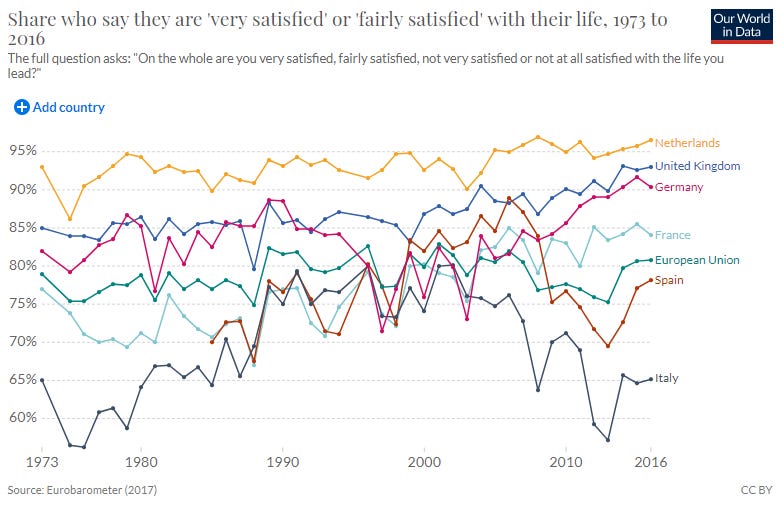
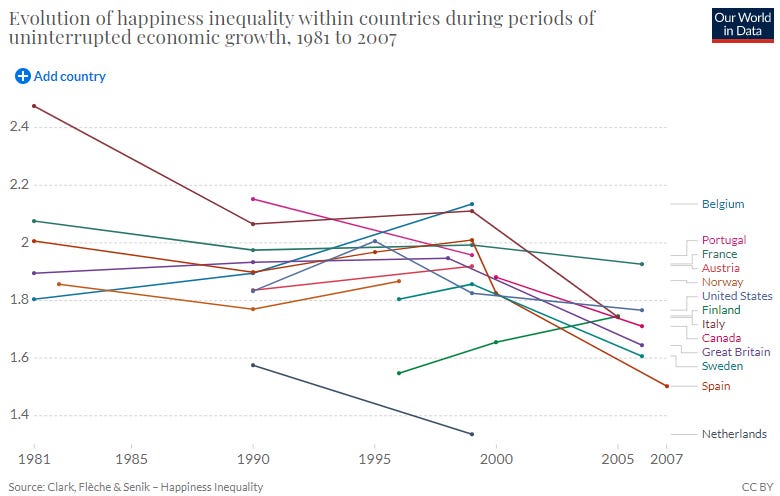
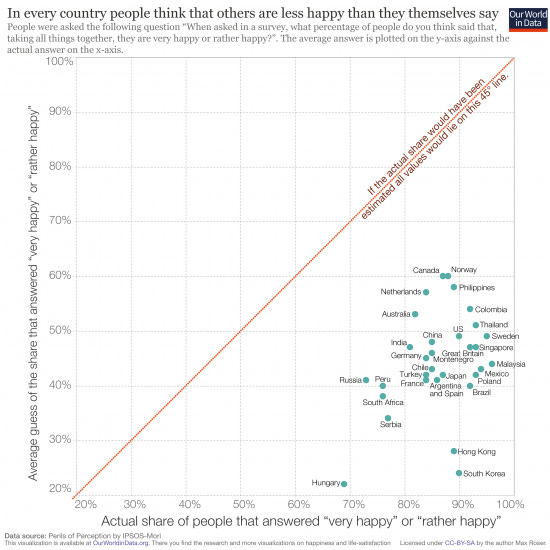

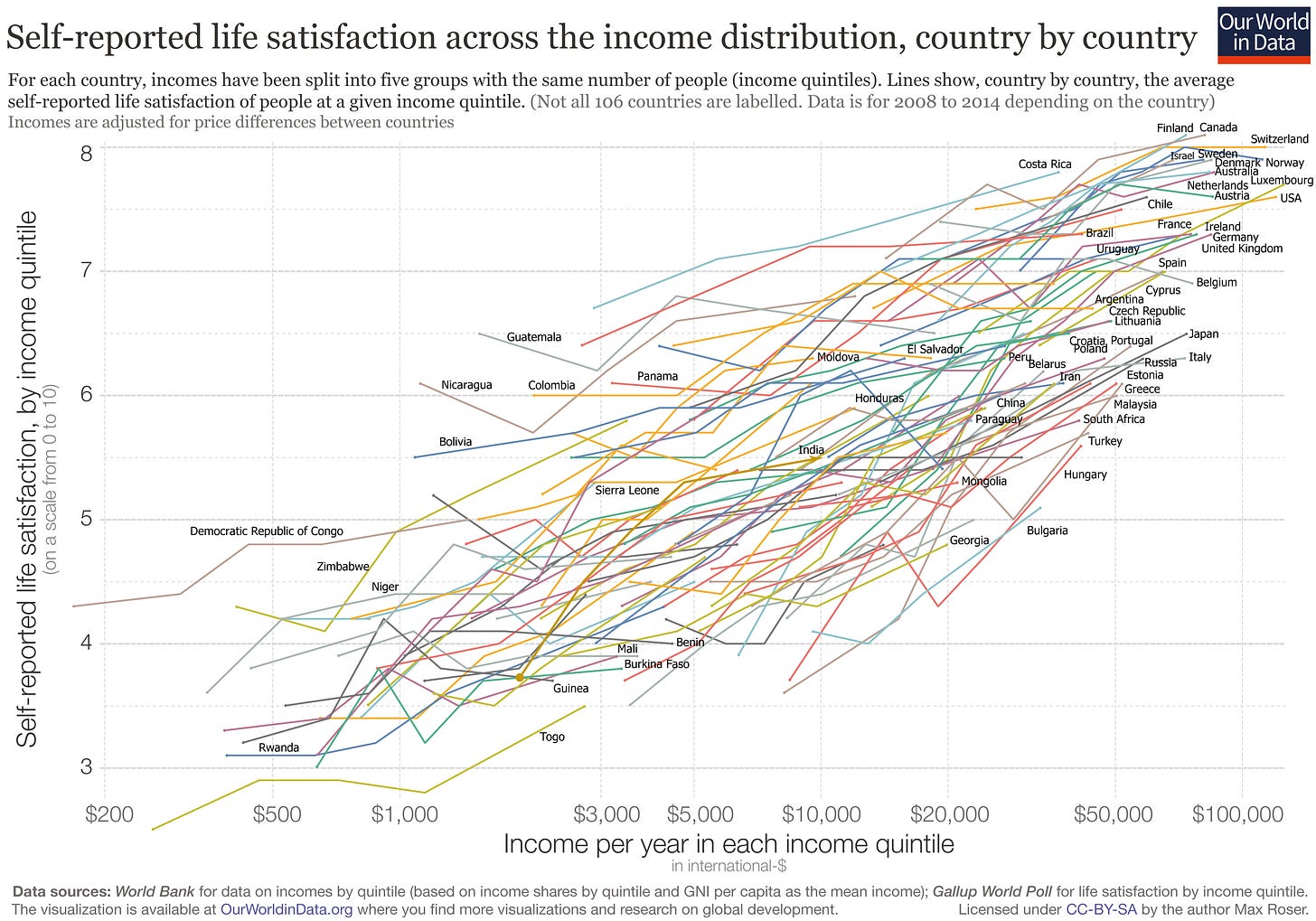
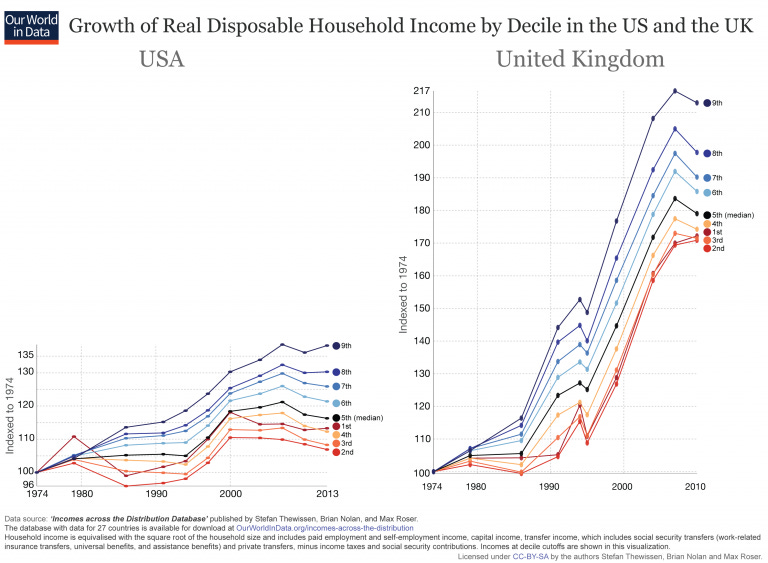
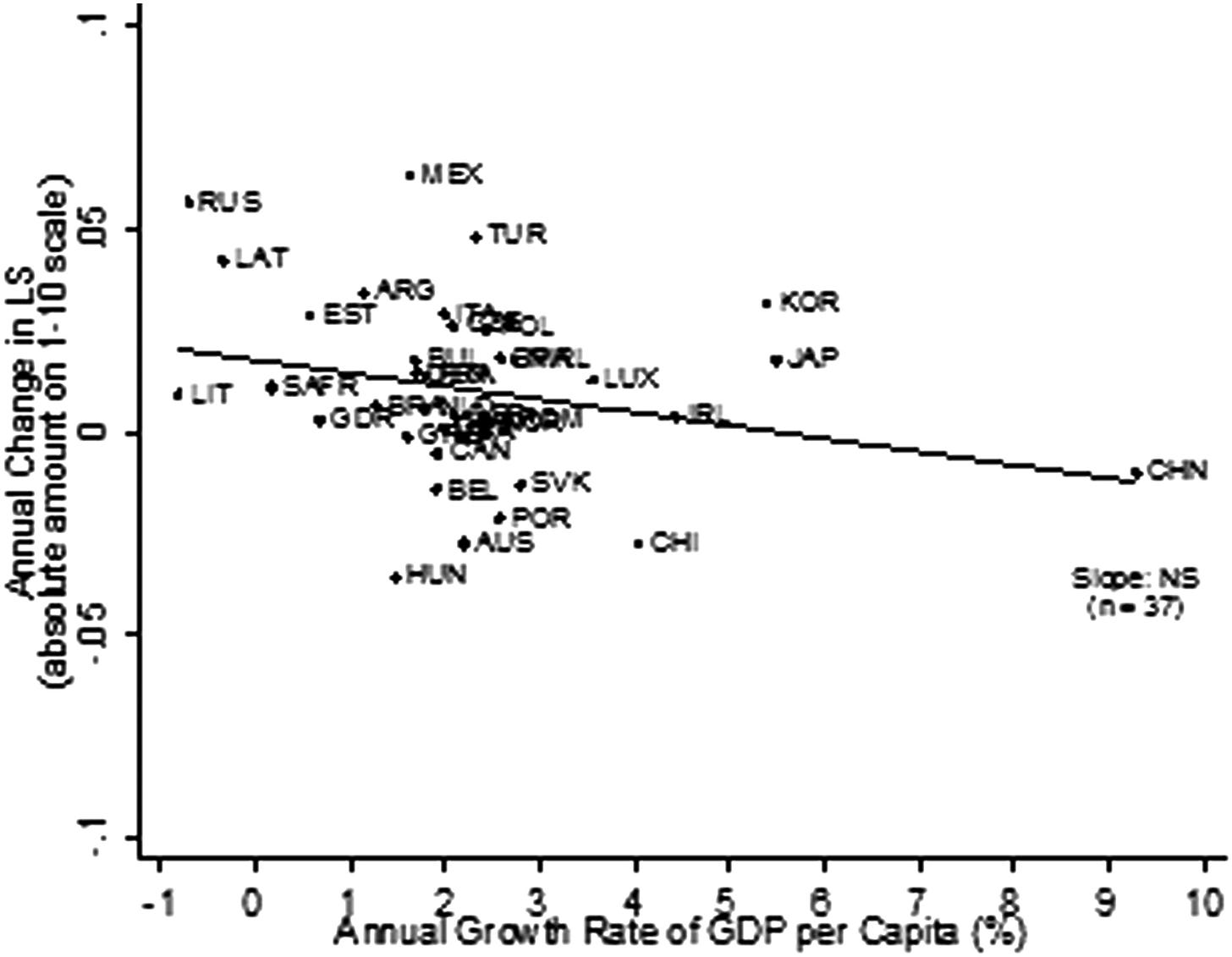
"For most of human history, inequality of wealth meant inequality of happiness. Status, and its related activities, envy and emulation, drove consumption"
How do they know? For all the (tremendous) inadequacies of current happiness measures, they're vastly superior to *anything* from 1CE or 1000CE, and I'm unaware of any metric from say, 1800, that's worth taking seriously as a total societal measure.
Likewise, for that matter, even the claim regarding the earlier Gilded Age. Yes, some in the chattering and writing classes were angry – there are always some people angry, everywhere, about something. But what's the evidence that *most* people were in some way dramatically unhappy (and if so, that the unhappiness was related to income disparities)? After all, plenty of people were trying to immigrate to the US during that period. Were they all extraordinarily deluded about the better lives they hoped for in the US?
Sounds like an ideological stance, not a statement of fact, as revealed by the subsequent fury that "[making poor cool] makes income inequality less emotionally salient"...
I used to think the graphs showing income vs happiness had some relevance to this argument; now I suspect they're being drastically misinterpreted. Let me give another viewpoint:
- people are happier when they feel they have substantial control over their lives, especially in matters like choice of and change in career, or in where they live
AND
- countries that provide this choice (to some extent effect, perhaps to a larger extent cause) tend to be wealthier; people are working harder in jobs they are better at.
The graph of life satisfaction against income, IMHO, mostly proves the point. At the higher income levels. the countries with lowest life satisfaction mostly seem to be those where one's stereotypes suggest not much control over one's life and career, like Japan, or income from commodities (so again, not from an especially productive and self-chosen workforce) like Russia or South Africa.
I don't know the details of every country (why are Portugal or Italy so low?) but maybe, like Japan, social and family pressures to be educated and take a particular type of job are higher than we might imagine, those countries (in certain social aspects) are still living in the late 1800s even though we project onto them the expectation that they are just like America in the 2020s?
In other words the expectation is that simply making a country richer (by winning some magic lottery) will not make it happier, and other things we know about the natural resource curse (even in countries that haven't had fighting, like South Africa or Russia) seem to suggest this. Saudi Arabia or UAE are generally considered "impressive" in certain ways, but no-one's wishing they could move there because their populations all seem so happy.
And pushing a political program that's supposed to increase (or at least spread out) the wealth, if necessary at the cost of reducing this flexibility to choose one's life, seems like a bad idea if the goal is actually to increase national happiness.
"You need to feel like life's pretty good right now and also that it will continue to get better." True - but that doesn't mean that either of those measurements are actually based on raw economics, as opposed to things like the range of choices realistically open to one...
I think it's an expectation issue, i.e. the "self-reported" part of "self-reported life satisfaction."
I adjust my expectations about what I should be striving for, what's realistic, based on the conditions I see out there in the world.
To someone born a thousand years ago we all live in unimaginable wealth and splendor, beyond the reach of kings. Those born a thousand years hence would seem the same to us. But I do not measure my happiness by either of them.
I expect to have food available near me all the time. Famine is not part of my life, and the freedom from it does not bring me joy in my day, even though experiencing it would immiserate me.
Similarly, I do not expect to live forever. That I lack access to uploading, biological immortality drugs, or angelnet protections does not make me sad or depressed. There's a narrow exception if, perhaps, I have been spending a lot of time reading very engaging sci fi; but even that is just an echo of the dissatisfaction I felt just a few years ago when I was unable to afford my own residence or health insurance.
The culture shock going across those time spans would move me sharply out of "happy" or "depressed" and into "hellish" or "heavenly."